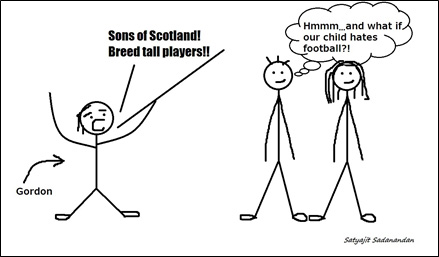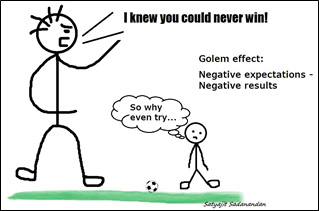Myth: Some people have a genetic advantage in soccer.
Fact: There is no such thing as ‘in-born’ or genetic talent.
When Scotland missed out on a World Cup 2018 spot after coming third behind England and Slovakia in the qualifiers, Gordon Strachan, the team manager and a former star player, reasoned:
“Genetically we are behind. In the last campaign, we were the second smallest, apart from Spain.”

His proposed solution: “Genetically we have to work at things, maybe we get big women and men together and see what we can do.”

Heil Gordon! We know where that leads…

“Soccer Talent is genetic” or “Footballers are born, not made” or “Football is in their blood” are among the biggest myths going around in football since ages.
This theory of genetic superiority in football is not supported by scientific or even practical evidence. It is a lazy armchair explanation that overlooks several other important reasons for success in football.
And this may be hurting your child’s prospects as many people in the sport, including some coaches, have this wrong belief. It may even lead to a self-defeating psychological complex in your child, known as the Golem Effect.

Let us put this theory to some logical tests by examining some examples that are commonly cited in its favor. Then look at some of the World’s latest research on this subject. Finally, understand how it impacts your child negatively and what you should do to turn it around and ensure the highest possibility of success.
Do Countries Like Brazil Have Superior Soccer Genes?
For decades, coaches in many countries believed that Brazilian players are born with superlative skills. This theory was so widespread that in countries like England, the coaches did not even focus on teaching technical competence. Their young footballers practiced with far fewer touches and there was an overreliance on long ball methods. The result was that English football regressed over time while countries like Spain took over the skill mantle from Brazil.
Quality of practice and environmental catalysts rather than genes determines the difference in football performance globally.
Many countries in the World were once very good in football but are now not at that level. Norway was a top team in the 1990s (FIFA Rank 2 in 1993, beat Brazil in 1998 WC and Spain in Euro 2000) but is so bad now that recently it was beaten by Azerbaijan (FIFA Rank 107). Malaysia was among the top teams in Asia in the 1970s and is now struggling with FIFA Rank 167. Scotland is the oldest football-playing nation besides England and has not qualified for the World Cup or Euro in the last 20 years.
Have their football genes worsened over time?
On the other hand, there are many countries that didn’t perform well but now regularly compete at the highest levels: Switzerland (FIFA Rank 8); Iceland (FIFA 37, with a population of about 300,000); Japan (never played in a World Cup till 1998 but among the best in Asia since then).
Have their football genes improved over time?
Gene changes don’t happen so frequently or even over a few hundred years. It takes thousands of years for the basic genetic structure of any organism to change. So genetic dominance of certain ethnicities in football cannot be so fleeting.
Is Regional Dominance In India Due to Better Soccer Genes?
These days every Indian National football team across any age group has a large proportion of the players from Manipur and Mizoram. But West Bengal, Punjab, Goa, Kerala and Maharashtra used to dominate Indian football for several decades. These states won the Santosh Trophy, the top domestic tournament in India till 1996, several times. And a majority of National team players till the 1990s came from there. Today these former powerhouse states struggle to contribute even half as much to the National teams compared to Manipur and Mizoram.
Some coaches in India now believe that better genes are behind the success of North Eastern footballers. However, this is not supported by facts.
Manipur became the first North Eastern state to win the Santosh Trophy only in 2002. And it was not as if the North Eastern potential was hidden from sight. The Indian football team captain in the 1948 Olympics, Dr Talimeren Ao, was from Nagaland. Moreover, Bardoloi Trophy, a prestigious National club tournament was organized annually in Assam from 1952. But there was only one other North Eastern player in the National team from 1950 till late 1990s.
Why is the dominance of Manipuris and Mizos so recent if they are naturally gifted? And why is it that only Manipur and Mizoram dominate? Shouldn’t other states like Nagaland or Arunachal Pradesh be equally successful if North Eastern genes are the reason for their success?
Some Other Facts That Can’t Be Explained By Football Genes
Majority of professional footballers don’t have professional football ancestry
Hardly any top footballer in the World has professional football lineage. For each exception like Kasper Schmeichel, you will find hundreds of others like Lionel Messi, Cristiano Ronaldo and Gabriel Jesus who have no family history in professional football or sport.
This is true for all professional footballers in every country – not just the top ones.
Players who grow up in a different country or region don’t excel
If genes determined football success, then players growing up anywhere should succeed as long as they belong to the right gene pool. But you hardly see players from any given region succeed when they grow up in another place. For example, all the Brazilian national team players have grown up in Brazil. Do you know any who hasn’t? In the entire history of Brazilian football?
Between 1500-2000 Brazilians play professional football outside their country every year. Their children, being Brazilians with pro-football lineage, should have the ideal football genes. Yet there are hardly any among these children who succeed as footballers.
Ethnic homogeneity is very hard to find in the modern world
Ethnic homogeneity is integral to the genetic dominance theory.
But Brazil is one of the most racially and ethnically diverse countries in the world. Historically Brazil has also experienced large degrees of ethnic and racial mix. So scientifically speaking, there is no one Brazilian race. Their footballers by extension are also ethnically very diverse, as is apparent. So how can one explain Brazilian dominance in football through genetics?
Similarly, the North East of India is not one racial or ethnic group of people. Manipur alone has at least 25 different ethnic groups with multiple clans in each. And there is no one clan or group there that produces the best footballers. So how can one explain their dominance in Indian football through genetics?
What Scientific Research In Genetics & Evidence Prove?
Nobody has been able to prove that any specific gene influences Football.
Football is a complex sport needing a combination of physical and technical requirements in different positions. For example, strikers often need to shoot while running fast and midfielders need to pass accurately while rapidly changing directions. These requirements differ based on the playing position. There are many different possible characteristics for excellence. So it is very difficult to identify the right genes to succeed in the game.
In comparison, simpler sports like Sprinting or Distance Running have more uniform technical and physical requirements for success. Logically then, given the huge incentives, massive funding, and intense research across the world, there should be conclusive proof for specific genes prominent in certain ethnic groups that at least help in Athletic success. But this is not the case.
For instance, better genes are often stated as an “obvious” cause of East African dominance in middle and long distance running. In their case, it is widely believed that birth and living at altitude produces great athletes, despite the great range in athletic productivity observed between areas of similar altitude.
This is especially so when one considers Kenya. Nandi, a relatively rural tribe who inhabit the mountainous Rift Valley region, comprise roughly 1.8% of Kenya’s population but have consistently supplied over 42% of the nation’s elite athletes. However, members of this tribe who have migrated to other parts of Kenya and the World since early childhood have hardly ever become elite athletes.
And if altitude was the main factor involved then all African countries with high altitude populations like Rwanda, Tanzania, and Zambia, as well as countries like Nepal, Peru, and Mexico, should be producing many world-class athletes. They don’t.
These findings have led researchers to acknowledge the importance of other factors like training intensity and quality, environmental conditions, motivation and psychology in running performance rather than gene pools and high altitude lifestyle.
The latest research in this field is focused on discovering a combination of interacting genes that could lead to an athletic advantage but it is suspected that even in such cases the leverage would be extremely marginal (less than 5%) and not overwhelming.
Here is what I learned directly from some reputed gene scientists:
“No genes have been found yet that are linked strongly enough with elite athletic success.
Over 200 genes have been discovered so far that are associated with physical performance and over 20 of them with elite athletic status. The most prominent of them are the ACE I/D1 gene that is linked to Endurance performance, and the ACTN32 gene associated with Power-oriented (Sprint) performance. In addition, certain genes are also claimed to predict injury risks and chances of recovery, such as APOE genotype.
But none can predict athletic accomplishment. Moreover, no specific ethnic groups have been found with an exceptionally high proportion of these genes.”
David Epstein gives the same conclusion in his book The Sports Gene, which shows that years of global genetic research have not been able to link sporting success to specific genes.
When genes can’t explain success in simpler sports like Distance Running, they certainly can’t for more complex sports like Football.
How This Impacts Your Child And What Should You Do?
As is obvious – Genes can’t explain success in Football.
But if the coach of a reputed National team like Scotland believes in this myth, imagine the extent of ignorance in the general football fraternity on this topic. Unfortunately, this ignorance is often amplified by the media and propagated by conversations across the spectrum including between coaches, players and fans. This leads to conscious or sub-conscious bias that can adversely impact your child.
Propagation of this myth can have a huge negative impact on a player’s self-belief brought about by lower expectation from the immediate ecosystem (family/friends/coaches/peers). Lack of self-belief leads to reduced motivation that in turn leads to low performance. It’s a negative self-fulfilling prophecy cycle, called the Golem Effect in psychology that can potentially end a player’s progress.

As a parent, the first step is to be convinced that genes are not important for football success.
The next step is to actively counter this myth when it comes up in discussions whether it is with your child or with anybody else in their football ecosystem including friends, teammates, other parents, and coaches. It is very important to dispel any doubts to the contrary that arise in your child’s mind with logic and the obvious facts.
If you feel that this myth is deep rooted and difficult to uproot from the immediate football ecosystem of your child, it would be wise to explore other more conducive environments whether it is a different team, coach or even school.
Pygmalion Effect is the opposite of Golem Effect, whereby positive expectations from the external environment lead to a better performance through enhanced self-belief. You should strive to have such an environment around your child, as it will result in greater success for your child in football and outside the game.

Key Takeaways
- There is no such thing as ‘In-born Talent’ or ‘Football Gene’.
- The myth of genetic superiority in football is dangerous for your child’s progress.
- Make this thought clear for your child and ensure it in his/her football ecosystem.
1 ACE I/D gene: Angiotensin-1 converting enzyme insertion/deletion polymorphism
2 ACTN3 gene: α-actinin-3 R577X polymorphism
References:
- http://thesportsgene.com/books/the-sports-gene/
- http://bjsm.bmj.com/content/34/5/391.full
- http://www.dailymail.co.uk/health/article-3741139/Why-East-African-runners-good-long-distance-races-altitude-desire-win-NOT-genetics-expert-reveals.html
- https://en.wikipedia.org/wiki/Demographics_of_Brazil
- https://en.wikipedia.org/wiki/Category:Ethnic_groups_in_Manipur

Dear Sir,
I am a parent of a 18 year old who wants to be a professional football player and as such is not at all interested in studies and this has me worried. I live in kollam, kerala.
Is there any way that i a consultation with MR.sadanandan could be arranged so me and my son could be clear in our minds with regards to his progress in football.
A reply in this regard will be highly appreciated.
Thanks and regards
Naseema Ali
Thank you for reaching out Naseema. A member of our team will get in touch with you shortly. Best Wishes
Dear Satyajith Ji,
Thanks for your insights especially for ( aspiring) parents. We are located in Pune and will be interested in pursuing football training planning for our son. Is there a chance if we could get in touch with you or your team in Pune? Request your advise.
Thanks..
Thank you for reaching out Rammohan. We will be in touch with you soon. Best Wishes
Dear Satyajith,
My son 10years old playing football in school level in Singapore. Is there any European coaching centre in Singapore
Thank you for reaching out Shankar. A member of our team will get in touch with you shortly. Best Wishes!
Hi my son is 9 month old. I would like to make him a professional football player . Would really appreciate your help. Regards
Hi Aslam, replied to your comment on the other post (https://smartsportsparenting.com/blog-soccer-practice-how-much/) - copying it here:
Thank you for reaching out Aslam.
While it is never too early to start but there are various phases of player development and these need different steps. At your son’s age (9-months) and until he is 5-years-old, structured coaching is not recommended. What will help is to expose him to the game in a way that makes it fun and enjoyable for him. Perhaps you can watch the game together, play with him and let him play with friends or siblings. Let him fall in love with the game naturally – without forcing it on him.
For him to succeed in the game, he has to love it – it can’t be through external pressure. Your objective at this stage is to create the right environment around him so he gets to play the game as much as he wants and have fun while doing so.
At around 5-years, you can start looking for training programs which are age appropriate and even then, the key would be for him to learn while continuing to have fun without any pressure (till he is 8-10 years).
If you need specific inputs at any point, please get in touch with my team through email to set up a consultation.
Best wishes!
Hi,
My son Shaurya 10 years old play 2 hours daily from last 3 years and he want to get professional training.
Pl recommend for making him successfully career in football.
We are residing at Vimannagr Pune
Thank you for reaching out Kailas. A member of our team will get in touch with you shortly. Best wishes!
Good afternoon!
Will like to know what steps to be taken to help with development of my 9 1/2 yr son.
Also, how the growth of skills can be helped.